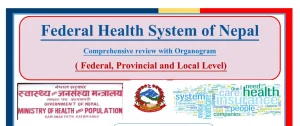Koshi Province has officially unveiled its Provincial Health Policy 2082. This policy is a comprehensive framework aimed at strengthening the province’s healthcare system. It aligns with Nepal’s federal structure. This policy sets a new milestone for ensuring universal access to affordable, equitable, and quality health services for every citizen of the province.
1. Background
With the federal system granting provinces greater autonomy, Koshi Province has prioritized public health as a fundamental right. This policy seeks to bridge gaps in healthcare infrastructure, enhance service delivery, and ensure inclusivity for vulnerable groups such as women, children, and marginalized communities. It also aligns with the national health strategies and the Sustainable Development Goals (SDGs).
2. Current Health Status of Koshi Province
The policy provides a clear snapshot of the province’s health indicators:
- Average Life Expectancy: 69.4 years (compared to the national average of 71.3 years)
- Maternal Mortality Ratio: 175 per 100,000 live births
- Institutional Delivery Rate: 58%
- Under-5 Mortality Rate: 28 per 1,000 live births
- Child Malnutrition: Stunting at 36%, wasting at 3.5%, and underweight at 12%
- Mental Health Issues: 13.8% prevalence among adults and 11.1% among adolescents
- High Out-of-Pocket Expenditure (OOPE): 48% of health expenses
These statistics highlight persistent gaps in maternal and child health, mental health services, and financial protection, demanding urgent interventions.
3. Key Problems, Challenges, and Opportunities
Problems
- Inadequate access to affordable, quality primary healthcare.
- Limited availability of specialized health services at the provincial level.
- Rising burden of non-communicable diseases (NCDs) like hypertension, diabetes, and mental health disorders.
- Geographic and socio-economic barriers preventing equitable access to care.
Challenges
- Shortage of skilled human resources in both rural and urban health facilities.
- Weak coordination between federal, provincial, and local levels.
- Insufficient regulation of private healthcare providers.
- The growing threat of climate change and cross-border disease outbreaks.
Opportunities
- Increased political commitment towards health.
- Legal recognition of health as a fundamental right.
- Scope for leveraging digital health technologies and telemedicine.
- Opportunities for public-private partnerships (PPPs) to expand specialized services.
4. Vision, Goals, and Objectives
- Vision: Healthy human capital, prosperous Koshi Province.
- Goal: Ensure physical, mental, social, and emotional well-being for all citizens.
- Objectives:
- Expand universal health coverage (UHC) with a focus on quality and accessibility.
- Strengthen emergency preparedness for epidemics, pandemics, and disasters.
- Enhance multi-sectoral collaboration for integrated and sustainable health systems.
- Reduce financial barriers and improve social protection mechanisms.
5. Strategic Directions and Policies
The policy lays out strategic interventions to achieve its vision:
- Expansion of primary health care (PHC) services with a focus on rural and underserved areas.
- Upgrading hospitals, Ayurveda centers, and community-level facilities to provide quality care.
- Strengthening maternal and child health services to reduce preventable deaths.
- Scaling up mental health and NCD programs with evidence-based interventions.
- Integrating digital health platforms for improved service delivery and monitoring.
- Establishing effective risk communication and health emergency management systems.
6. Institutional Arrangements
To support implementation, the policy emphasizes:
- Enhancing coordination between federal, provincial, and local levels.
- Capacity building of health workers and administrators.
- Evidence-based decision-making with robust monitoring and evaluation systems.
7. Looking Ahead
The Koshi Provincial Health Policy 2082 represents a transformative shift in the province’s approach to health governance. By embracing innovation, strengthening systems, and ensuring community participation, the province is poised to achieve universal health coverage and deliver on its promise of equitable and quality healthcare for all.
Access FULL PDF File HERE
Discover more from Public Health Concern Nepal
Subscribe to get the latest posts sent to your email.










